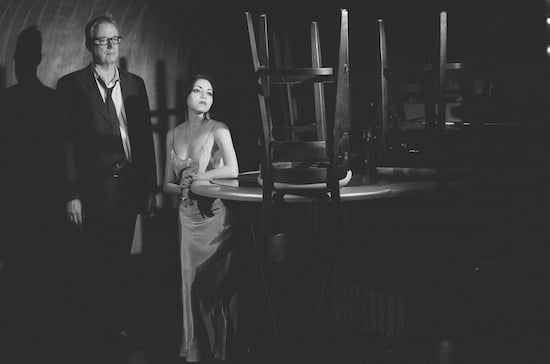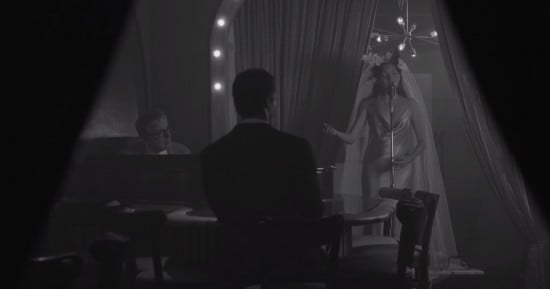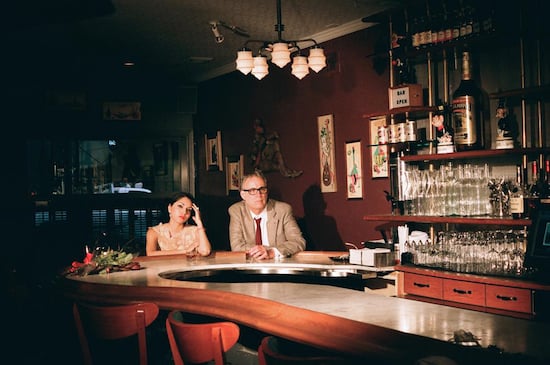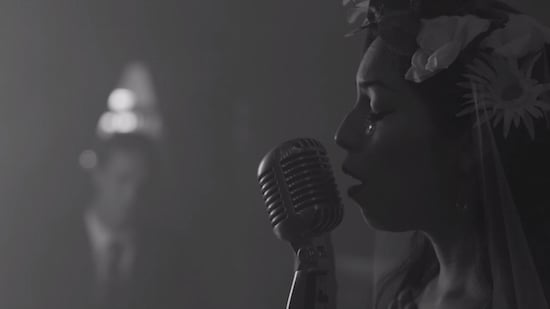THIS: Drop a Torch
By:
February 22, 2016

Misery loves an audience, but in the music of after-hours noir duo The Duchess and the Fox, the forlorn and hopeful feel as if the singer and piano-man are listening to us. The aria of heartbreak from vocalist Andrea Diaz and delicate clatter of pianist Joe McGinty reverberate with neo-cabaret, classic torch and postmodern pop drama, drawing on a wellspring of epic emotion and solitary misery that stretches back across music history and rings with the melancholia of our own uncertain times. Their first five-song EP and videos of uncollected studio and live work are available through their site, but the shadowed shelter of a century-old bar was the best place to encounter them before asking what it’s all about. A few days after Every Night.’s launch concert, we sat separately over these questions in our blue screens’ lonely light…
HILOBROW: From the mid-1980s onward, pop singers (Linda Ronstadt, Sinead, Rod Stewart, I think Lemmy maybe :-)) were revisiting the canon of American “standards,” but only in this century are artists generating new music from the same source (though to my ears, usually more authentically than the remakes) — Melody Gardot, you guys, maybe a few others. What do you think caused the shift and what does it signify?
DIAZ: I think personally, the reason why I wanted to visit the feeling of American Standards is the same reason why I like having a bowl of borscht at B&H, or going to the Met and having a drink at the Carlyle afterwards. Every day in New York, another gem of the old world gets destroyed in favor of something shinier, more generic, maybe more palatable. I think certain artists, myself included, are longing to retain the spirit of the old, without compromising our own originality or perspective. In my mind, writing songs like ours is an attempt to rescue the beauty of another time or way of being that is continually encroached upon.
McGINTY: I think that it’s easy to have nostalgia for an era that you are too young to have experienced. Of course one tends to be nostalgic for the “cool” things that happened in that time. And there are great things to draw from, musically, stylistically, and artistically. The “standards” have stood the test of time. Though we live in an era of nostalgia, I think it’s important to kind of have nostalgia for the present. Looking around to see what’s happening now. And fusing the sound of a bygone era with lyrics that are personal and reflect our current times is a good combination. And for me, more interesting than recording cover songs.
HILOBROW: I love that phrase from your song-title, “half-faced man,” like he goes around with his noir mood-lighting painted on. Your music creates mental movies, and at your live sets it feels like we’re being enveloped in some faroff time that’s being conjured. How important is that sense of setting and visuals and theatrical context to the music itself?
DIAZ: I love it when performances are immersive and the audience feels like they are stepping into an alternate universe. I think our music could work in many places but the sense of setting and theatricality gives the viewer another way to “suspend reality” to borrow a film term, and really cross the threshold from mundane life to something different and hopefully ecstatic. Being in a sumptuous, quiet room also encourages people to relax and engage in the kind of sensuality and magic we are trying to convey.
McGINTY: It’s nice when our music is in a situation that suits it. [Lower East Side antique bar] The Red Room has been perfect for us. But of course we’re open to performing anywhere that the audience would pay attention.

HILOBROW: Joe’s playing seems to pitch and roll in the same way that Andrea’s vocals soar and swoop — what is the compositional kernel of your collaboration, or is it more of a conversation between what voice and piano point each other to?
DIAZ: I feel like the songs are definitely a conversation between the two of us. I have always been really inspired by the piano parts Joe has brought to me. For me it’s a matter of balance — making sure each of us has enough space to bring our particular gifts to complete the sound.
McGINTY: When I get the (increasingly rare) situation where I’m in that “open” space and I can sit at the piano and just let the creativity flow, anything can happen. Some ideas get tucked away, others thrown away and some will seem right for Andrea. And those are the ones that I present to her. But also, it’s good to narrow my focus a little bit and sit down with the idea of creating something that will inspire her.
HILOBROW: Joe has spoken about bringing this project slowly together in the aftermath of any kind of record industry… and it seems post-machinery in other ways too. Though there are several artists I’ve compared you to, there’s only one that reminds me of you, and they sound nothing like you — the mournful electronic duo Laika from the 1990s. Yours is music and voice we could still enjoy if every web and grid collapsed. So even though you produce an amazing palette of sounds and feelings, is there some determination to express as much as you can with as simple means as there might be?
DIAZ: Definitely. I love electronic music, and so does Joe, which you can tell by the amount of synths he has in his studio. However, there’s something about the simplicity of piano and voice together that allows the integrity or the structure of the song to stay intact. I think with all the technology available for people to use now — the sounds, samples, effects — they enable people to create a really amazing production, but underneath all that, sometimes you find that there’s really no melodic structure holding the whole thing together. I don’t mean to say it’s bad, but somehow it can be overwhelmingly open-ended. I want our songs to be as stunning and as structurally sound as an old building from the 1800s that will age gracefully, and not some newly built loft that will crumble after a few years.
McGINTY: Yes, it’s great that this project grew out of our piano and vocal collaboration. And I feel like the test of any song is if it can work in that context (or guitar and vocal). It’s true, I love electronic music, and also big orchestral pop songs. But what’s great about this project is that it can work as a piano and vocal duo, but we can also add other instruments when possible (as we did at the EP release party). I like the combination of electronic instruments and organic instruments. There are tastes of cello, violin, vibraphone, horns and vintage synthesizers on the EP. But I never let any of those touches take away the focus from the piano and vocal setting.

HILOBROW: Andrea, there’s this grand, tragic feeling of the sacrificial figure in your stage and video persona — from the classic doomed speakeasy diva to specific saintly imagery (love the milagro-tears in the “Every Night” video). Is the torch singer the martyr of the modern metropolis, and what kind of comfort or power does this give?
DIAZ: The singer and the saint are both empowered with a mission, and they are a voice for their respective ideals. I think the torch singer is usually a woman who is perhaps a bit damaged, maybe a little unhinged, but funny, and wise. She sees into the dark spaces of the culture, of the metropolis. She witnesses human behavior — the drunks, the cheaters, the lovers, the ugliness and the beauty. Traditionally she is a wounded person too, who has her own story of heartbreak or betrayal with which she must contend. So this is actually her sacrifice and her power. She opens herself up for other people to feel whatever it is they need to feel in that moment, and it’s difficult. But her power comes from her compassion and her ability to bring light to what was in the shadows. So then again, there is a parallel between the singer and the saint. In their most evolved states, they aim to shepherd people from their fears into a space of understanding. There is comfort in their benevolence. Even in the dingiest of dive bars, the torch singer will sing to you, and even if you’re a sinner, the saint will bring you closer to heaven.
HILOBROW: In a related way, Joe, your piano playing often emphasizes the percussive nature of the instrument, bringing to mind both the emphatic festivity of saloon music and a kind of funereal toll. Is that a line it’s important to balance over?
McGINTY: Interesting observation. I never looked at my playing that way, but then again, I never really look at my playing from an outsider’s perspective. Someone at the show noticed that we tend towards waltzes (in a complimentary way). And I was like, “Oh yeah, I guess you’re right!” But I see what you’re saying. I look at it pretty simplistically, that we try to balance the slow songs and the fast songs. If it were all funeral tolls or all saloon music it would get a bit monotonous. I like a bit of variety, but I still think everything has to stylistically fit into the same “box.” Andrea and I have written a few songs that we feel don’t quite fit. So we try to stay consistent but also keep it interesting.
HILOBROW: Lyrics like “I used to be your present” are so loaded — on the surface a melancholy Christmas song, but even more, like someone who feels they’re trapped outside of time. Are there some sadnesses we’re fated to keep reliving? How does this musical form speak to our present?
DIAZ: Well, there are two facts that we as humans know to be true. One is that we exist in time, we perceive time and we live our lives in time, and the other is that one day, our time ends and perhaps some other form of existence begins. So in a sense, we are fated to relive sadness, because all things change, and there are some moments we would rather keep, but there is no stopping the flow. I think our musical form in particular speaks to our desire to hold precious moments or memories in our minds in a culture that moves and discards things quickly. It is music tinged with nostalgia for the moments that can never be relived, only remembered. So in a way you’re right. We hold these moments, “outside of time,” but we’re not prisoners, we’re just visiting, catching up, sharing a drink. It’s about cherishing life really, even though sometimes it sounds like a lamentation. That’s why there’s humor and cheekiness in some of my lyrics and Joe’s piano playing. We’re not all doom and gloom. We want our songs to be tender, and funny, and sad, and angry, and ultimately bittersweet, just like life.

HILOBROW: Modern phrases and place-names poke through the timeless lyrics and consciously retro style, like a flaw in the matrix, and your videos sometimes use that black-and-white/color counterpoint that anyone born after 1900 tends to associate with past/present. Though the black-and-white in your case often seems not less full than the color, but more comforting, like a keepsake. How scary is the unknown future, and that tidal pull of the past, and what do we need from each?
DIAZ: I think hopefully we take the wisdom of the past and apply it in the future. Nothing is ever perfect, but each time you build, if you’re paying attention, you get to change at least one thing that improves your condition, your process. Often we have to make the same mistakes over again, but hopefully each time we do, we fail a bit better and take what we learned, and do it again, until finally we don’t make the mistake again. We ascend into the future with a different level of mastery and completion.
McGINTY: It’s nice to revisit those times (like looking at old photographs) but I think it’s important not to live in the past and to keep looking forward. As an artist and freelance musician, there are a lot of unknowns in the future. It can be scary but it can also be exciting. Those things kind of go hand in hand. But that’s why we live the life we chose.
MORE POSTS by ADAM McGOVERN:
Adam’s weekly THIS: column | PEOPLE YOU MEET IN HELL, a 5-part series about characters in McGovern’s and Paolo Leandri’s comic Nightworld | Two IDORU JONES comics by McGovern and Paolo Leandri | BOWIEOLOGY: Celebrating 50 years of Bowie | ODD ABSURDUM: How Felix invented the 21st century self | CROM YOUR ENTHUSIASM: C.L. Moore’s JIREL OF JOIRY stories | KERN YOUR ENTHUSIASM: Data 70 | HERC YOUR ENTHUSIASM: “Freedom” | KIRK YOUR ENTHUSIASM: Captain Camelot | KIRB YOUR ENTHUSIASM: Full Fathom Five | A 5-part series on Jack Kirby’s Fourth World mythos | Reviews of Annie Nocenti’s comics Katana, Catwoman, Klarion, and Green Arrow | The curated series FANCHILD | To see all of Adam’s posts, including HiLo Hero items on Lilli Carré, Judy Garland, Wally Wood, and others: CLICK HERE